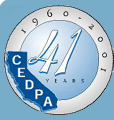

DataBus - Vol 41 No. 3: April-May, 2001
|
Spotlight on Technology: Technology Literacy Challenge Grant — Project TEC
According to David Bowling, Coordinator for the six districts that make up the technology consortium known as Project TEC (Arvin Union, Beardsley, Fairfax, McFarland Unified, Standard, and Vineland), technology use has..."grown exponentially" since the implementation of the Technology Literacy Challenge Grant. The consortium of small districts currently will have used TLC funds to place nearly 1000 computers online by the end of the 2001 school year. Additionally, with the help of E-rate, each district has provided state-of-the-art servers and infrastructure to accommodate six or more computers in every K-12 classroom across the consortium. Even with the considerable expense of hardware and network infrastructure, the primary goal of this program is not the acquisition of hardware. The main goal of the program is finding unique ways for six separate school districts with limited resources to work together to coordinate and implement a staff development program focused on effective integration of technology to promote learning in all curricular areas. Project TEC (Technology Enhanced Curriculum) was first established in the fall of 1997 to attempt to narrow the region's digital divide. A Technology Literacy Challenge Grant award in 1998 gave the consortium the funds it needed to implement the vision and design of the project. A major percentage of the Kern county's socio-economically disadvantaged families are served the by the consortium, in an area captured in print by John Steinbeck's, "The Grapes of Wrath". The consortium is the first of its kind in the Southern San Joaquin Valley. At the close of the 2000 school year, the project had provided a technology center to all fourth and fifth grade classrooms as well as libraries across the districts. The centers consist of six multimedia computers, network printers, digital cameras, scanners and a suite of software for instructional use. There are approximately 90 such centers across the consortium. This, the final year of the program provides modern computers labs and peripherals at each district for use by middle school students. A major focus of the TEC consortium continues to be staff development. The training model has evolved from productivity to technology/curriculum integration. Consortium-wide raining begins each year with two day-long "boot camps" for targeted teachers in grades four through six. In addition to the camps, two "re-boot" sessions are held prior to a week long "Summer Technology Institute" at Bakersfield College, which occurs just before each new school. Teachers receive a stipend for these five-hour sessions. To ensure that teachers receive training at their level of comfort, they may choose one of three classes based on their perceived technology proficiency; beginning, intermediate, and advanced. Training is conducted by Project TEC Coordinators representing each of the six districts that provide a new lesson plan integrating technology for each session. Three additional consortium-wide sessions, spaced throughout the year, are held on weekends. In addition, each district maintains support personnel to provide ongoing training and teacher assistance throughout the school year. A popular event that has grown out of the training sessions is the "Curriculum Swap Meet". During this workshop, teachers involved with Project TEC spend a Saturday presenting hands-on sessions demonstrating successful technology-integrated lessons with their peers. David Bowling states that the success of this project has centered on a strong collaborative effort and the desire of the superintendents from each school district to ensure that funds spent on educational technology enhance instruction in meaningful ways. District leaders meet regularly to discuss the project, and plan future endeavors, and technology coordinators across the consortium work together to develop training modules and solve technical issues. Mr. Bowling, and Superintendents Michael McGuire (Arvin Union Elementary), Ken Chapman (Beardsley Elementary), Adolph Wirth (Fairfax Elementary), Dr. Roberto Cardenas (McFarland Unified), Dr. Erich Kwek (Standard Elementary) and Stephen Greenfield (Vineland Elementary), have pooled their personnel and resources to positively change education through this collaborative consortium. Opportunities not possible for these small, rural school districts just a few short years ago have been embraced and leveraged through successful implementation of the Technology Literacy Challenge Grant. If you have any questions about Project TEC, please contact Mr. David Bowling, (661) 903-1023 or by e-mail, .
Dr. Joyce Hinkson is a consultant for the California Department of Education's Education Technology Office. She may be reached at (916) 323-2241 or by e-mail at
|
CEDPA